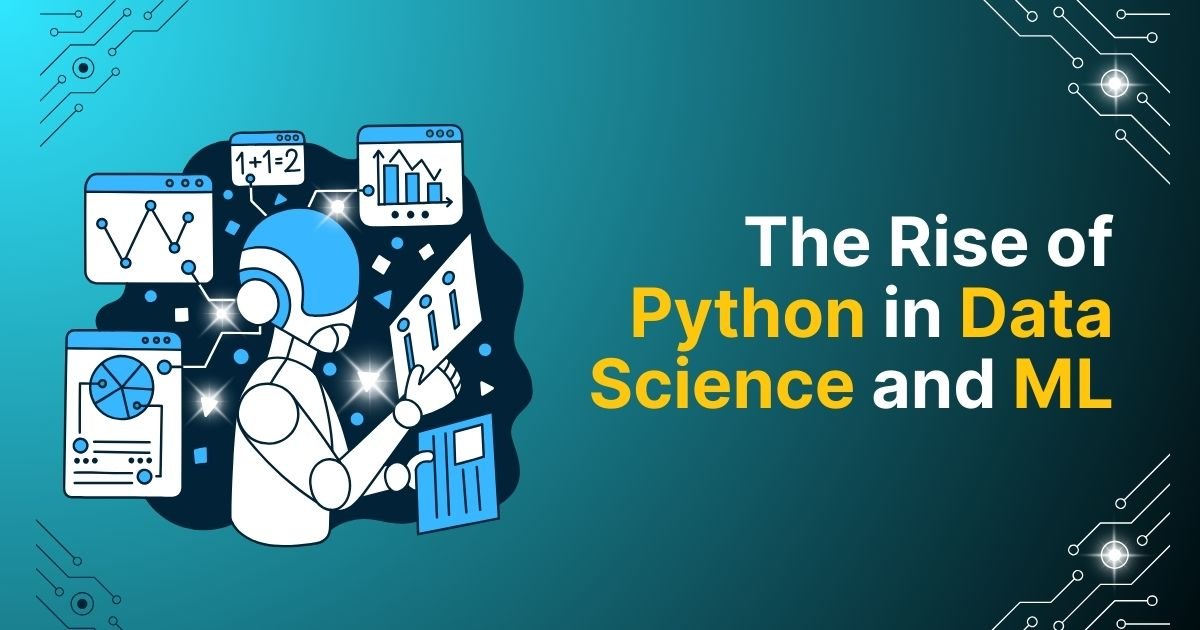Python has become one of the most dominant programming languages in recent years, particularly in data science and machine learning. The flexibility, simplicity, and vast array of libraries make Python a go-to language for developers and data scientists. This article explores the rise of Python in these fields, why it’s favored, and how hiring skilled Python developers or partnering with a Python development company can help businesses harness the power of data-driven solutions.
Why Python Is Dominating Data Science and Machine Learning
Python’s popularity in data science and machine learning has skyrocketed due to several key factors:
1. Simplicity and Readability
Python is known for its simplicity and ease of use, making it an accessible language for both beginners and experts. Its clean syntax allows developers to focus more on solving problems rather than getting caught up in the complexities of the language. For data scientists and machine learning engineers, this means rapid prototyping and faster development cycles.
2. Extensive Libraries and Frameworks
One of Python’s greatest strengths lies in its rich ecosystem of libraries and frameworks tailored to data science and machine learning. Libraries such as:
- NumPy: Used for numerical computing and handling large datasets.
- Pandas: Simplifies data manipulation and analysis.
- Scikit-learn: A key library for machine learning, offering tools for classification, regression, clustering, and more.
- TensorFlow and Keras: Widely used for deep learning applications.
These libraries allow Python developers to build complex data models and algorithms with less code. Businesses can leverage these tools to create advanced machine-learning models that provide insights and predictions with real-world impact.
3. Strong Community and Support
Python boasts a vast and active developer community, which continuously contributes to the improvement of the language and its ecosystem. Open-source libraries and tools are consistently updated, and developers have access to countless tutorials, documentation, and forums. This robust support system makes it easier for companies to hire Python developers who are well-versed in data science and machine learning.
How Python Transformed Data Science
The field of data science involves gathering, processing, analyzing, and visualizing data to extract valuable insights. Python has become the preferred language for this domain due to its capabilities to manage data-driven tasks efficiently.
1. Handling Large Datasets
With the rise of big data, businesses handle enormous datasets that need to be processed quickly and efficiently. Python’s libraries, such as Dask and PySpark, allow data scientists to process massive amounts of data without performance bottlenecks. This scalability makes Python a reliable tool for businesses seeking to analyze large data streams.
2. Data Visualization
Effective data visualization is critical for communicating insights. Python offers several libraries, such as Matplotlib and Seaborn, for creating comprehensive charts, graphs, and plots. These tools help data scientists visualize patterns and trends, making it easier for stakeholders to make informed decisions. A well-designed dashboard using these libraries can transform raw data into actionable business strategies.
3. Predictive Analytics and Machine Learning
Python excels at predictive analytics and machine learning tasks. Through libraries like Scikit-learn, developers can create sophisticated machine learning models that predict future outcomes based on historical data. This capability is transforming industries such as finance, healthcare, and e-commerce, enabling businesses to forecast customer behavior, market trends, and risks.
Python’s Role in Machine Learning Advancements
Machine learning involves the development of algorithms that allow computers to learn from data. Python has played a pivotal role in advancing machine learning due to its seamless integration with deep learning frameworks and its versatility in developing AI solutions.
1. Integration with AI and Deep Learning Frameworks
Python’s compatibility with deep learning frameworks like TensorFlow and Keras has made it a popular choice for developing AI models. These frameworks simplify the creation of neural networks, allowing developers to focus on building innovative AI solutions. For instance, facial recognition systems, natural language processing, and autonomous vehicles are just a few examples where Python-based machine learning models have revolutionized industries.
2. Cost-effective and Scalable Solutions
Many businesses are opting for custom machine learning solutions developed in Python due to the cost-efficiency and scalability it offers. By partnering with a Python development company, businesses can implement machine learning models tailored to their specific needs. These models can be scaled as the company grows, providing long-term value.
3. Real-Time Data Processing
Python’s ability to handle real-time data is crucial for machine learning applications that require instant feedback. A real-time monitoring dashboard can be built using Python to process live data and make real-time decisions. This capability is particularly useful in sectors like healthcare, where rapid data processing can enhance patient care through quicker diagnostics.
Why Hire Python Developers for Data Science and Machine Learning Projects?
1. Expertise in Handling Complex Projects
Hiring experienced Python developers ensures your business has access to skilled professionals capable of handling complex data science and machine learning projects. These experts are familiar with the nuances of Python and can leverage the best practices to deliver optimized solutions. They understand how to implement algorithms, manage data pipelines, and build scalable architectures that support advanced analytics.
2. Custom Solutions Tailored to Your Business Needs
A Python development company can offer custom solutions designed specifically for your business. This means that whether you need a predictive analytics tool, a real-time monitoring dashboard, or a machine learning model, the solutions can be built to meet your exact requirements. Custom Python development allows for flexibility and innovation, giving businesses a competitive edge in the marketplace.
3. Cost-Effective and Scalable Development
Outsourcing Python development is often a cost-effective option for businesses looking to implement data-driven solutions without building an in-house team. Hiring Python developers or partnering with a Python development company can provide access to a wide range of expertise without the overhead costs of maintaining full-time employees.
The Impact of Python on Various Industries
1. Healthcare
Python has enabled healthcare providers to leverage machine learning models for diagnosing diseases and predicting patient outcomes. The integration of real-time monitoring dashboards has improved patient care by enabling doctors to monitor health data remotely and in real time.
2. Finance
In finance, Python is used to create predictive models that help banks and financial institutions forecast market trends and customer behavior. Risk analysis, fraud detection, and algorithmic trading are some of the major applications of Python in this sector.
3. Retail and E-commerce
E-commerce businesses are using Python to analyze customer data and develop personalized shopping experiences. Machine learning algorithms predict customer preferences, optimize pricing, and enhance recommendation systems, leading to increased sales and customer retention.
Conclusion: Python’s Future in Data Science and Machine Learning
The rise of Python in data science and machine learning has reshaped how businesses approach data analysis and predictive modeling. Its simplicity, rich ecosystem of libraries, and strong community support make it a powerful tool for both beginners and experts.
For businesses looking to stay ahead in the data-driven world, hiring skilled Python developers or working with a Python development company is crucial. These experts can provide custom solutions, enhance efficiency, and help you gain actionable insights from your data.






Leave a Reply